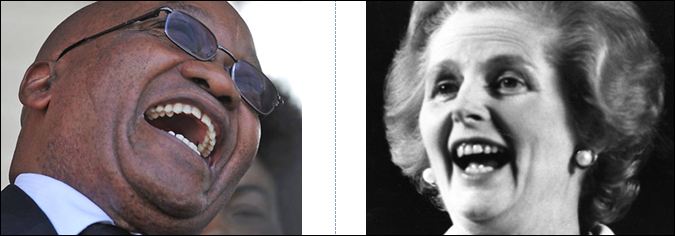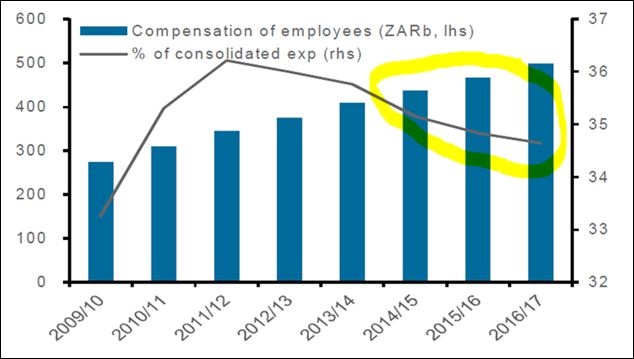I intend, in the near future, to dust off my Marxist theory.*
I am going to need a framework through which to express my growing conviction that much of our politics can be understood as a function of the collapse of the alliance of classes that underlay the national democratic revolution – and the African National Congress.
The big driver is the strongly emergent black middle class – or perhaps competing versions of that class. In the background is a sort of bad kung fu movie fight scene involving the industrial working class, various parasitic elites within the state and party, a comprador bourgeoisie and a whole mess of tribalists, proto-fascists, landless peasants and lumpen proletarians of various stripe.
(The camera occasionally flicks across the deeper shadow behind, where we almost catch a glimpse of Moeletsi Mbeki’s lurking oligarchs, watching us.)
It’s my job to have some kind of understanding of what is going on … and I will need all the help I can get theory-wise.
In the last week the ANC has given strong hints that the Labour Relations Act amendments are being held up because government wants balloting prior to strikes and a ‘forced mediation’ strike-breaking mechanism. (See here.)
Also we have the astonishing re-emergence of the (excellent) idea that we should break up Eskom and sell off some of the bits and get the private sector to build other bits. (See here … and btw I can’t help but notice how much interesting news is written by Carol Paton of Business Day.)
What’s going on?
Well, one things is government is facing further downgrades because it can’t pay its bills.
The biggest bill of all is public sector wages, which will be renegotiated before the current wage agreement expires in March 2015.
That bill will represent above 35% of non-interest government spending and the wage level the employer and the employee eventually agree upon and the degree of disruption that accompanies the bargaining is extraordinarily important for South Africa and therefore for the stability of the governing party.
Also government is burning due to its apparent inability to get the endlessly promised infrastructure built. At least part of the reason is the constant labour stoppages, for example at Kusile and Medupi.
Having lost much revenue (and political support) during the recent strikes led by Amcu and Numsa, the ANC government is forced to find a way to rewrite the terms of engagement between employer and employee.
Also Eskom is bleeding … or potentially bleeding … government dry.
The case for privatisation is threefold: you get money from the asset sale to pay your debts, you don’t have to keep bailing out the loss-making enterprise and you get the ‘efficiencies’ (the removal of structural impediments to growth) that supposedly come from the private sector running the enterprise.
(As an aside: privatisation seldom works quite like that. This government, and the people of South Africa, have barely recovered from the the drubbing we received from the ‘private sector’ following the partial privatisation of Telkom in the 90’s. But desperate times, desperate measures … and all of that.)
The groups that traditionally oppose these policies are in disarray. Cosatu has essentially collapsed in a heap – and the most energetic sections of organised labour are actively hostile to government/ANC anyway and no longer require wooing … or rather, following Marikana and various statements of outright hostility by the ANC and government leaders, are no longer susceptible to those old sweet lies.
The forces that shaped our labour market are profoundly changed.
A growing mystery to me is where the SACP is in all of this?
So its all: hello 1996-class project, we who threw you out with the bathwater at Polokwane in December 2007 would like to apologise and welcome you back. Don’t worry, the communist are in China learning how to deal with corruption and with the labour force … you can chat to them if they ever come home.
So meanwhile here is a sort of ancestor to my questioning the ‘class character’ of the moment; a column I wrote for the Compliance Institute of South Africa in November last year:
Is this Jacob Zuma’s Maggie Thatcher moment?
I admit that on the face of it the comparison seems something of a stretch.
For example I can’t think of an ‘Nkandla’ equivalent in Baroness Thatcher’s world – although her son seemed to benefit from parental political power in much the same way as Jacob Zuma’s myriad offspring seem to be enjoying.
The point, though, is Thatcher came to power with the reforming mission to roll-back back the influence of organised labour and to make labour markets more flexible– all as part of her attempt to stop an on-going recession, bring summer to the ‘Winter of discontent’ (paralysing wage strikes by public sector unions in Britain in 1978-1979) and increase employment and economic growth.
(‘Thatcherism’ as a political-economic ideology is also considered to include attempts to keep inflation low, shrink the state – by privatising state owned enterprises – and keep a tight rein on money supply … (and is not famously concerned about employment – Ed) … but let’s leave those details aside and stick with the matter of organised labour.)
Much to my surprise there is growing evidence Jacob Zuma is forcing a showdown within the Congress of South African Trade Unions (Cosatu) – and between the members of the ruling alliance (the ANC, the SACP and Cosatu).
Since 1994 it has been a good bet that tensions in the ruling alliance would flare up and then subside – but that the constituent ideological factions and organisations would always back off from a real split.
The ruling alliance has always seemed to me like a vaguely unhappy marriage that none of the parties have the resources or discipline to leave.
I have been covering South African politics and financial markets since 1997 and in 1999 I commissioned this cartoon :
The original caption read: ‘She means nothing to me’, he pleaded unconvincingly. ‘You’re the one I will always love’.
The report that accompanied the cartoon – which I originally published for the then stockbroker Simpson Mckie James Capel – made it clear that the man in the middle represented the ANC and his entreaties were addressed to Cosatu and the SACP … while his real passion (and the furtive fumbling behind his back) was for business, global and domestic. (Cathy Quickfall drew the cartoon and did a better job than I could have hoped for: the Cosatu/SACP figure’s naive and hurt innocence, still wanting to trust Mr ANC; business in a sharp suit, her disdainful look into the distance with just the busy hand behind her back revealing her urgent and furtive intent.)
It has looked for many years as if the dysfunctional relationship would continue for ever – that the parties involved (both the institutions of the ANC, the SACP and Cosatu but also the myriad ideological factions that exist across those organisations) have more to gain from being inside and more to lose from being outside.
But, surprisingly, it appears that the ruling faction within the ANC (the incumbent leadership, represented by Jacob Zuma) appears to have finally drawn some kind of line in the sand with the ‘left’ unions within Cosatu, most obviously the National Union of Metalworkers of South Africa.
The first signs that this was happening appeared when evidence surfaced that Jacob Zuma’s allies within Cosatu were moving against Zwelinzima Vavi, the now suspended secretary general and strident ‘left’ critic of corruption in the ANC and critic of the slightly more business-friendly economic policy (particularly the National Development Plan) of the Zuma government … (remembering that this was written late last year and Vavi has now been reinistated … sort of – Ed).
At first it appeared that Vavi would be got rid of by being accused of corruption or some form of financial mismanagement related to the sale of Cosatu House for a price less than it was worth. While that investigation was still on-going, Vavi handed his enemies a perfect excuse to suspend him by having sex with a junior employee in the Cosatu head-office earlier this year (last year – Ed).
Since the suspension of Vavi his allies in Cosatu, especially the biggest affiliate (the 350 000 member Numsa) has been on a collision course with both Cosatu itself and with the ANC.
The conflict is likely to come to a head at the Numsa special congress to be held on December 13 – 16.
Why do I see this as, partly, Zuma’s Maggie Thatcher moment?
Well, Vavi’s suspension is only the proximate cause of the impending collision. The ‘real’ or ‘underlying’ causes are what are important.
Vavi, Numsa secretary general Irwin Jim, his deputy Karl Cloete – and probably a majority of Numsa leaders and shop stewards … and several other groups and leaders within Cosatu) appear increasingly of the opinion:
- that Cosatu has been bullied by the Zuma leadership into accepting policy positions with which it (generally) disagrees
- that the ANC under Zuma has attempted to turn Cosatu into a ‘labour desk’ of the ANC and the alliance summits have become nothing but a ‘toy telephone’ rather than a real joint decision making forum for the ANC/Cosatu/SACP alliance
- the policy positions with which this group disagrees are, particularly, the National Development Plan, but also e-tolling, the Youth Wage Subsidy and the ANC government’s failure to ban labour brokers. (The reasons why this ‘left’ group opposes these policy measure are crucial: they oppose the NDP because it is seen as ‘neo-liberal’ and anti-socialist; e-tolling because it is seen as covert privatisation of public infrastructure; the youth wage subsidy because it segments the labour market, threatening Cosatu’s monopoly and potentially exposing ‘protected’ Cosatu members to competition from ‘unprotected’ youth workers; and the failure to ban labour brokers because those institutions are also anathema to Cosatu’s monopoly.)
- that the ANC under Zuma has been captured by a crony-capitalist regionally based (possibly ethnic) elite bent on looting the state
- that the gamble to back Zuma against Mbeki has badly misfired
There is widespread press and analyst speculation that the tensions within Cosatu could lead to the federation splitting – and in some way or another the more specifically ‘socialist’ pro-Vavi, Numsa-based group leading Cosatu – or a piece of Cosatu – out of the ruling alliance.
In what way is this ‘Zuma doing a Maggie’?
Well, because the disgruntlements of the Vavi/Numsa group (described above) are real and represent significant shifts against organised labour by the Zuma government.
If we add to the youth wage subsidy, the NDP, the failure to ban labour brokers, e-tolling in Gauteng to the very tight budgeting for public sector wage increases mentioned in my October column I think we have a strong circumstantial case that Zuma’s ANC has moved decisively to roll-back the power of organised labour.
Why Jacob Zuma and his allies might have done this is revealed clearly in the anaemic Q3 GDP growth figures of 0.7 per cent compared to the previous quarter, or 1.8 per cent on a year-on-year basis . Almost across the board analysts and economists have ascribed most of the weakness to labour unrest, particularly in the motor vehicle sector – where the recent strikes were organised by Numsa! (Again, remember that this was written in November last year … just imagine how many exclamation marks he would have used if he had written that sentence today? -Ed)
Numsa has also helped plague Eskom’s flagship Medupi project – and has undoubtedly contributed to government’s infrastructure plans looking shaky.
The ANC’s motivation is not purely an attempt to fix economic growth – and bring to an end our own ‘Winter of Discontent’. Vavi and his allies in Numsa have harried and harassed the ANC leadership over corruption – and particularly the upgrade to Nkandla – and this has clearly helped force the hand of the Zuma ANC to drawn a line in the sand with the left-wing of Cosatu – especially as the ANC enters an election and struggles to cope with this level of internal dissent and criticism.
The resignation earlier this week of Numsa president Cedric Gina (who, unlike the majority of his Numsa colleagues, is close to the current ANC leadership: his wife is an ANC MP and he probably has similar ambitions himself) is probably an indication that the Zuma/ANC allies intend contesting Numsa’s direction in the lead-up to the Numsa special congress in December. The ANC leadership has probably decided to fight it out in Numsa – and Cosatu more generally – making sure that if/when a split occurs the faction that sticks with the ANC/Zuma/SACP is as large as possible and the faction that defects is as small as possible.
The big risk for investors and financial markets associated with a possible split in Cosatu is that Vavi/Jim group is likely to contest with unions within Cosatu that currently support the ANC and Zuma’s leadership – most obviously and most unsettlingly – with the National Union of Mineworkers which has complained repeatedly that Numsa is poaching its membership. This potential for a widespread contestation of each workplace and each economic sector between a new ‘Cosatu’ and an old ‘Cosatu’ is probably the most important threat represented by the unfolding crisis.
Politically the Vavi/Jim group will likely be campaigning against the NDP, the youth wage subsidy, e-tolling and Nkandla-style corruption just as the ANC’s election campaign peaks early next year. I do not think a split in Cosatu will translate automatically into specific electoral declines for the ANC – it is possible and even likely that Numsa members who support a split could still vote for the ANC.
However, one of the big unanswered questions is whether the defecting faction has any possibility of linking up politically with the EFF. Up until now the defecting faction linked to Vavi and Jim have unequivocally rejected the EFF on the grounds that its (the EFF’s) leadership are ‘tenderpreneurs’ (much like the Nkandla faction of the ANC) who just happen to be out in the cold.
However, the EFF’s support for nationalisation of mines and expropriation of white owned farms with or without compensation does dovetail with aspects of the Vavi/Jim faction’s essentially socialist ideology.
My own view is that in the event of a split it is possible that the Vavi/Jim faction forms a ‘labour party’ which could only feasibly contest elections in 2019.
The motivation for Thatcher moving against the unions was as much about weakening the Labour Party as it was about repairing the economy – so we shouldn’t dismiss the Zuma/Thatcher comparison purely because his motivations are mixed.
If Zuma and the ANC succeed in reducing the militancy and power of organised labour it is possible that they will have contributed in a small way to laying the grounds for an improvement in public education, for a period of recovery and even extended economic growth.
It’s a risky – and complicated – business, but it was for Baroness Thatcher as well.
* It was, in our eyes, a fine hat and we cocked it jauntily. And thus attired, and to our very great satisfaction, we successfully answered all the important epistemological questions of the day. We let the cowards flinch and traitors sneer as they boastfully proclaimed the end of history. We were history … or at least, through the complex functioning of the intelligentsia in Marxist Leninist theory … we were history’s engine made flesh. And the race wasn’t over … we were merely getting our breath back.




Privatization of Eskom will only work if there is genuine competition between at least three or four providers. When Thatcher privatized water she guaranteed multiple monopolies by PREVENTING competition; Reagan did something similar with Electricity and Enron was the result. Private Cell phone companies give good service because it is so very easy for a customer to switch from one provider to another. It will never be that easy to achieve this in electricity so legislators will have to make it as easy as possible – only then will competition drive efficiency.
An alternative (and I am not sure whether this has been tried anywhere) is for the Electricity Utility to be community owned, and managed by a Board elected by the stake holders – with voting rights in proportion to their consumption.
Wow, a fascinating read. Many thanx…
Thanks Anthony … don’t know if I can deliver on my promises … but I am going to give it a go!
Hi Nic , I’ll read this a bit later , have you seen the research in Die Burger this morning , in the financial page (used to be more pages ) regarding RSA’s Financial cliff in 2028 , due to Goverments policy of social grants expanding ? It may add perspective . Incidentally , do you remember Nicky , Sandy and Andy’s son who lived down the alley from us ? He lives i n Moscow , has a Russian girlfriend , trains their cricket team ( not sure which one ) and dabbles in export /import on the side. D
Remember him well .. in fact he trained my youngest for a while … part of the Green Point Cricket Club … I will go out and buy Die Burger in a mo .. sounds interesting …